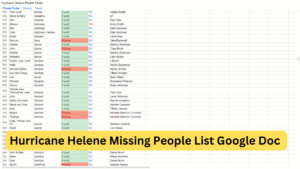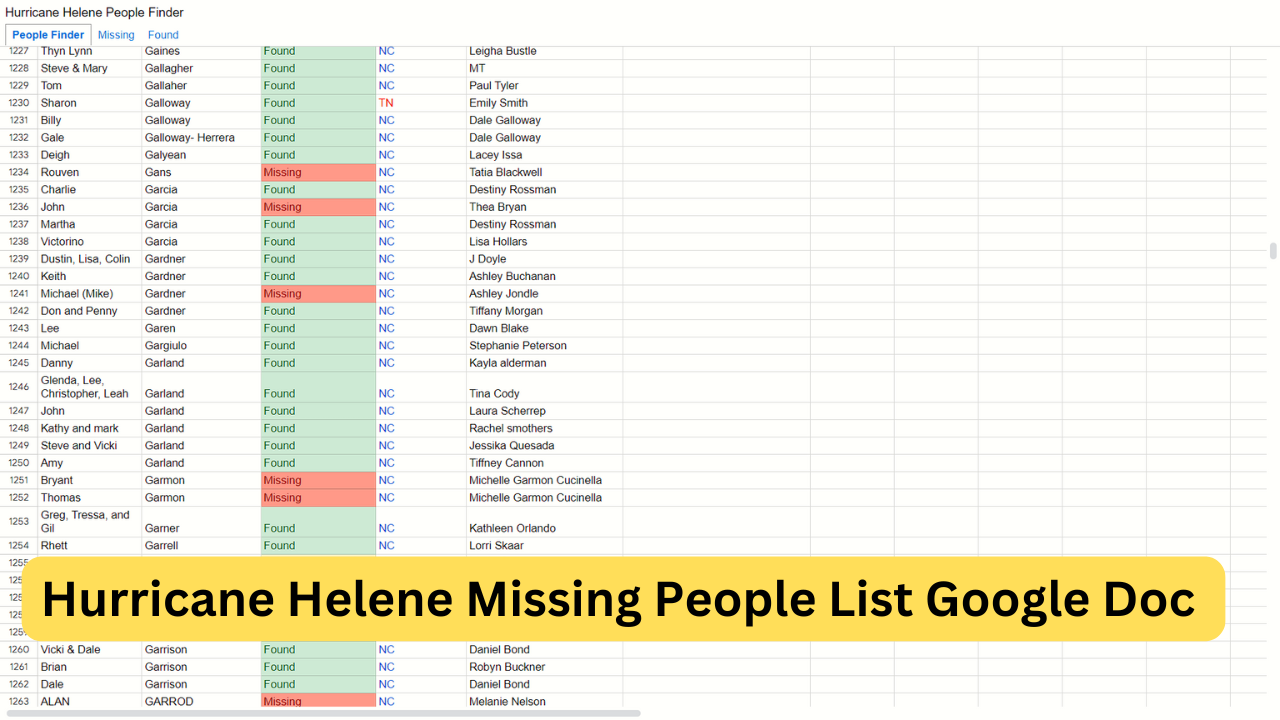Hurricane Helene Missing People List Google Doc
Click here –
Hurricane Helene: Missing People List and Rising Death Toll
The devastation caused by Hurricane Helene continues to unfold, with an unknown number of people still missing and a death toll that tragically rises with each passing day. Communities are grappling with the overwhelming consequences, and families remain desperate for information on their loved ones. As emergency response teams work tirelessly, questions persist about the number of those still unaccounted for and the process of identifying the missing.

The Aftermath of Hurricane Helene: A Crisis Unfolding
Hurricane Helene, one of the most powerful storms of the year, wreaked havoc across the Atlantic, leaving a trail of destruction that has displaced thousands and caused significant loss of life. The full scale of the disaster is still being assessed, but initial reports indicate catastrophic damage in coastal towns and cities. Communities are struggling to recover as search and rescue operations continue, focusing on locating missing individuals who may still be trapped or in need of urgent medical assistance.
With thousands of homes destroyed and entire neighborhoods submerged in floodwaters, authorities are working around the clock to compile a comprehensive missing persons list. However, the chaos and logistical challenges make it difficult to gather accurate data, leaving many families in a state of limbo, awaiting news of their loved ones.

Why is the Number of Missing People Still Unclear?
The sheer scale of the disaster has overwhelmed local governments and emergency responders. Many regions affected by Hurricane Helene have limited infrastructure and resources, making it challenging to coordinate large-scale rescue operations. Additionally, communication networks have been severely disrupted, further complicating the process of identifying those still missing.
The missing persons list continues to grow as people report loved ones unaccounted for, while some survivors are relocated to shelters far from their original homes, adding to the confusion. It is also possible that some individuals may have been evacuated to areas where records were not properly kept, making it harder to track their status.
Efforts to Locate the Missing
Authorities have mobilized numerous resources to search for the missing, with teams scouring wreckage in both urban and rural areas. Air and sea searches are ongoing in the worst-affected regions, where flooding has made it nearly impossible for ground teams to navigate. At the same time, relatives of the missing have taken to social media and local radio stations, hoping to share information and reunite with loved ones.
A Google Doc missing persons list has been circulated, updated regularly as new information becomes available. Local governments and nonprofit organizations are urging people to check the list and provide any relevant information to assist in the search efforts.
The Increasing Death Toll: A Grim Reality
As rescue workers dig through the wreckage left by Hurricane Helene, the death toll continues to rise. Initial figures were reported as conservative estimates, but as more bodies are recovered from collapsed buildings and floodwaters, it is clear that the final count could be much higher. Many of those who perished were likely trapped by rising floodwaters or hit by debris as the hurricane tore through homes and infrastructure.
Medical facilities in the affected regions are overwhelmed, struggling to treat both survivors and recover bodies in areas that are still difficult to access. Many families are left waiting for confirmation, unsure if their loved ones are among the dead or still missing.
Identification of Victims: A Lengthy Process
The identification process is complex and slow-moving. In areas where the destruction is severe, it is often impossible to immediately identify victims due to the condition of their remains. Officials are relying on dental records, DNA testing, and personal items found with the deceased to help in the identification process. For many families, this wait is agonizing, as they try to reconcile their hope with the harsh reality of the disaster.
Support for Families of the Missing and Deceased
In the midst of this crisis, efforts are being made to provide psychological and emotional support for the families of the missing and deceased. Many have lost not only loved ones but their homes and livelihoods as well. Local governments, in collaboration with international organizations, have established grief counseling and support centers to assist those in need.
However, the scale of the disaster means that resources are stretched thin, and many families are left waiting for help. Authorities are calling for more support from international organizations to cope with the growing demands for food, shelter, and psychological assistance.
What You Can Do to Help
As the search for missing individuals continues, organizations are encouraging people to volunteer and donate to relief efforts. Many humanitarian groups are on the ground providing much-needed supplies and medical care, but they require further assistance to continue their work. Whether through financial contributions or by spreading awareness on social media, every bit of support can help make a difference in the ongoing recovery process.
Additionally, if you have any information about missing individuals or are looking for loved ones yourself, be sure to check the Google Doc missing persons list and stay in touch with local authorities.
The Road to Recovery: Long and Uncertain
The road to recovery for communities affected by Hurricane Helene will be long and uncertain. With so many people still unaccounted for, the emotional and psychological toll on survivors is immense. Rebuilding efforts are underway, but for many, the first priority is to find out what happened to their loved ones. As the situation develops, the missing persons list continues to grow, and the need for effective coordination between authorities and relief agencies remains critical.
In the coming weeks and months, as more information becomes available and search efforts yield further results, the full scale of the tragedy will become clear. Until then, communities affected by Hurricane Helene will continue to search for answers, hoping to bring closure to those still searching for their missing loved ones.
As recovery efforts from Hurricane Helene continue, it is important to recognize the significant challenges ahead. The storm not only left behind physical destruction but also shattered the lives of countless individuals and families. Entire communities are dealing with the loss of homes, jobs, and, most devastatingly, their loved ones. The missing persons list remains a haunting reminder of the uncertainty many face, and the rising death toll is a stark reflection of the storm’s brutal impact.
Challenges Facing Rescue and Relief Operations
In addition to the search for the missing, relief efforts face numerous obstacles. Floodwaters, debris, and damaged infrastructure have made many areas difficult, if not impossible, to access. Emergency services are stretched thin, with local responders receiving support from international aid organizations to cover the massive scope of the crisis.
Infrastructure Damage Slows Recovery
Hurricane Helene has caused widespread damage to roads, bridges, power lines, and water supplies, severely hampering efforts to reach the most affected areas. The destruction of communication networks in many regions adds another layer of complexity, as people remain unable to contact authorities or rescue teams. Relief teams are often forced to rely on outdated or incomplete information as they try to assess the damage and direct resources to the hardest-hit communities.
Temporary shelters are overflowing with survivors who have lost everything, with some waiting days to receive basic necessities such as food, water, and medical supplies. The slow distribution of aid is a growing concern, as conditions in these shelters deteriorate.
Public Health Risks in the Aftermath
The public health risks posed by Hurricane Helene are significant. Floodwaters have contaminated drinking water supplies, increasing the risk of waterborne diseases such as cholera and typhoid. In some regions, stagnant water has become a breeding ground for mosquitoes, raising the potential for outbreaks of diseases like malaria and dengue fever. Health care facilities are struggling to keep up with the influx of patients, as medical staff work around the clock to provide care in makeshift conditions.
Moreover, the psychological toll on survivors is profound. Those who have lost loved ones or remain uncertain of their whereabouts are experiencing high levels of stress, anxiety, and trauma. Mental health professionals are being deployed to provide support, but the need far exceeds the available resources. Many families will require long-term counseling and assistance as they attempt to rebuild their lives.
Government and International Response to the Crisis
Governments in the affected regions have declared states of emergency and are coordinating with international agencies to manage the crisis. The United Nations, along with various NGOs and relief organizations, has sent emergency response teams to provide assistance. These teams are working to restore critical infrastructure, provide temporary shelter, and supply food and clean water to the millions affected by the hurricane.
International Aid and Donations
Several international aid organizations have launched fundraising campaigns to support ongoing recovery efforts. Charities such as the Red Cross, Doctors Without Borders, and UNICEF are appealing for donations to provide emergency relief. Financial support is essential to cover the costs of medical care, food, shelter, and the rebuilding of infrastructure.
Governments from around the world have pledged millions of dollars in aid, while humanitarian agencies are distributing supplies and coordinating logistics. Military personnel from various countries have been deployed to assist in search and rescue missions, as well as to deliver critical supplies to isolated regions.
However, the long-term recovery process will require sustained international attention. Rebuilding homes, schools, hospitals, and other vital infrastructure will take months, if not years, and ongoing financial support will be critical.
Looking Toward Long-Term Solutions
As the immediate crisis begins to stabilize, attention will shift toward long-term recovery efforts. Rebuilding the areas affected by Hurricane Helene will require careful planning and coordination. Governments will need to work closely with urban planners, engineers, and environmental experts to ensure that communities are rebuilt to withstand future natural disasters.
Resilience and Preparedness for Future Disasters
One of the most critical lessons learned from Hurricane Helene is the importance of disaster preparedness and resilience. Coastal regions, in particular, must develop more robust flood defenses, emergency evacuation plans, and early warning systems to mitigate the impact of future hurricanes. Governments and international organizations are already discussing strategies to improve infrastructure, such as building hurricane-resistant homes and improving drainage systems to prevent future flooding.
Climate change is increasingly linked to the growing intensity and frequency of hurricanes like Helene. As global temperatures continue to rise, coastal communities will face greater risks from extreme weather events. Long-term strategies to address climate resilience will be essential to protect vulnerable populations from future disasters.
Hope Amid Tragedy
The tragedy of Hurricane Helene is one that will leave scars on affected communities for generations to come. As families continue to search for missing loved ones and mourn the rising death toll, there is hope in the form of global solidarity and support. The combined efforts of local authorities, international organizations, and volunteers are making a difference in the lives of those affected by this unprecedented storm.
The path to recovery will be long and difficult, but with continued support and cooperation, the communities devastated by Hurricane Helene will rebuild, stronger and more resilient than before. As we reflect on the lives lost and the ongoing search for the missing, we are reminded of the importance of preparedness and unity in the face of natural disasters.
